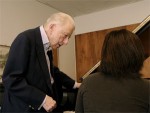Column Name
Title
On January 22, longtime piano faculty member Herbert Stessin died at 88. Born on June 16, 1922, Stessin graduated from Evander Childs High School in the Bronx and City College of New York. He studied at Juilliard with Sascha Gorodnitzki from 1949 to 1952, during which time he also made his Carnegie Hall recital debut and launched a busy career as a soloist. Stessin joined the faculty of what was then called the Juilliard School of Music Preparatory Division in 1959; he began teaching in the College Division in 1980 and was on the faculty through 2009, including four years as chair of the piano department. Stessin also taught at the Henry Street Settlement, Hunter College, N.Y.U., and the Aspen Music Festival. His wife, Nancy Stessin, died in 1997; he is survived by a sister, Belle Hammerschlag Trattler; a stepson, David Dundee; a niece, Stephanie Bernheim; a nephew, Paul Hammerschlag; and numerous other relatives. Orli Shaham remembers her longtime teacher.
Body
Herbert Stessin was my piano teacher for 14 years, and my good friend and second pair of ears for the following 14. Over time, I switched from calling him Mr. Stessin to calling him Herbert, from seeing him mostly in his studio to seeing him mostly at a concert or restaurant. As such I was in the unusual position of knowing several different sides of this intelligent, multifaceted, talented, and hilarious man.
Herbert was a consummate pianist. He lived and breathed the world of the piano and the music around it. He started studying at 6, having such teachers as Clarence Adler, Jose Iturbi, and Sascha Gorodnitzki. While he served in World War II, primarily in Germany as an interrogator of P.O.W.s, he also found opportunities to perform. In 1947, he began touring the United States with the violinist James de la Fuente. He also toured Europe, Japan, and North America, appeared as soloist with many symphony orchestras, and was heard on radio domestically and abroad. Longtime New York Times music critic Harold Schonberg called him “a fine musician.” Another critic said of his phrasing, “he transmits its line, its overall sense; he communicates.”
For much of Herbert’s life his primary focus was teaching. His studio on the fifth floor at Juilliard became a second home for countless young pianists. If he sensed you were going to play well, he would enjoy his cigar for a while before needing to comment. I remember vividly his fragrant sandwiches, his Boris Godunov poster, his piles of The New York Times, and his classes. In Pre-College, every Saturday at 4 you were expected—after a long day of classes—to perform for your peers, having completely absorbed his admonitions earlier that day. It was exhilarating, frightening, rewarding—and the most important career training I ever got. He would sit in the corner, Mrs. Stessin would preside regally next to him, and the rest of us would sit on our hands, trying to keep them warmed up. He would never make any comments while other students could hear. He was unswervingly protective of his students’ egos. As a teacher he would never impose his artistic visions on you, but rather help you to express your own ideas better, more clearly. He would play psychologist as often as teacher, guiding his students through problems with parents, boy/girlfriends, even landlords.
Herbert’s ear was infallible—the slightest hint of a phrase not thought out, a fingering chosen haphazardly, a sound from the piano that didn’t suit the music—he would catch them all in an instant. Students have said they were scared as could be before a lesson, because in front of him, you were naked. He demanded honesty in your playing: no faking notes, of course, but even more importantly no faking the emotions. The phrases had to speak genuinely. He had an incredible technique, fingerings that still dazzle me with their inventiveness and intelligence, and an ability to coax any sound he wanted out of the piano. All that was put in service of the music and of forever communicating through the music. I learned all this over many years with him, and it is both surprising and obvious that these would be precisely the traits mentioned most often in his early concert reviews. He had always been an honest musician.
Herbert was an excellent and supportive colleague. He would defend people vehemently. He also had one of the best senses of humor I’ve ever known, calling himself a sit-down comic. He had an ease with people and an incredible ability to flirt, even as a frail older man. One of my favorite lines was when he was asked how he would like his steak, he would say, “Just cripple the beast—I’ll catch it on my way out!” And he would only get funnier after that first vodka martini (the house vodka, please) straight up with olives. Then there was his infamous appearance on stage with comic character Dame Edna, matching her zinger for zinger.
I have been amazed by the outpouring of tributes from friends and colleagues from all walks of life, including “His puckish voice will ever be in my ears” and “[We] loved his mischievous spirit. The world will be a much duller place without him.”
Over the years, his students sent him dozens of cards, which he carefully saved. Among their sentiments: “Your agreement with your students’ free thoughts [make us] respect and treasure your suggestion the more,” “I miss your wisdom and guidance, and find your words creeping into my own teaching all the time,” and “Thank you for being such a great teacher and parent.”
Herbert Stessin will be remembered and missed by several generations of students who sweated through those lessons and emerged better musicians and better people, as well as by the many lovers of the piano and of clever humor whom he touched. His enormous list of successful students is his greatest legacy.





